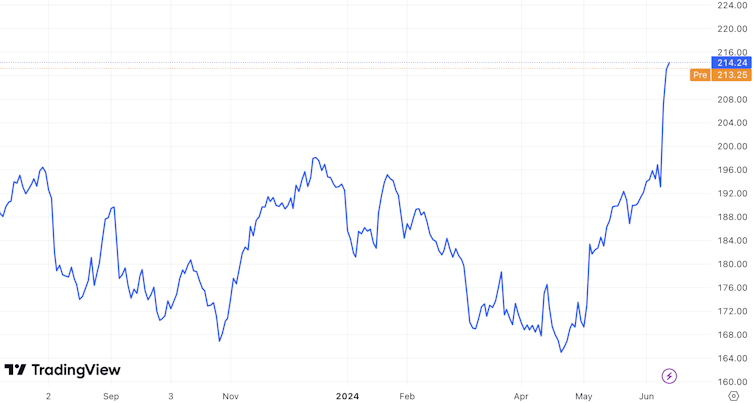Apple insists its ChatGPT tie-up will protect users’ privacy: here are the questions it must answer first
Apple, a company known for its longstanding commitment to user privacy, has received flak since unveiling its artificial intelligence (AI) strategy at its Worldwide Developers Conference on June 10. This relates to the centrepiece of Apple Intelligence, which gives users access to OpenAI’s powerful generative AI tool, ChatGPT.
Some users welcomed the new features, which will initially only be available from the autumn on iPhone 15 Pro and Pro Max phones as well as laptops and tablets running on the M chips introduced in 2020. But others expressed concerns about how this aligns with Apple’s privacy commitment.
Notably Elon Musk, a co-founder of OpenAI who walked away in 2018 over strategic differences, called Apple’s new partnership an unacceptable security violation. He threatened to ban Apple devices from his company offices and hinted at launching a privacy-hardwired Xphone in response.
In fact, Apple has also unveiled in-house AI capabilities with Apple Intelligence. Whereas most state of the art AI is accessed by customers through a cloud, Apple users will have a modest AI facility on their devices. As well as providing a smarter version of Siri, this AI will be capable of specific tasks such as producing different styles of writing, summarising the key points in email threads, and generating images and personalised emojis.
When users need greater AI capabilities, they will be able to turn to Apple’s new larger cloud-based AI, and also ChatGPT. This is where the concerns come in. For a company known for building its own technology, this sudden shift has led people like Musk to wonder why Apple cannot build all its artificial intelligence in-house.
These concerns are certainly valid and highlight the need for careful consideration of the implications of this collaboration with OpenAI which, like Apple, is based in California. However, it is important to note that Apple says it has taken steps to ensure that user privacy is protected. The ChatGPT features will be opt-in by default, and users will be prompted before any data is sent to that service. As Apple said in the press release:
Privacy protections are built in for users who access ChatGPT — their IP addresses are obscured, and OpenAI won’t store requests. ChatGPT’s data-use policies apply for users who choose to connect their account.
As for users accessing Apple’s own AI functionality, the company invited independent experts to inspect its code to verify that any data sent from devices is stored securely.
The questions for Apple
Apple’s approach appears to provide a strong foundation for privacy-centric AI. Though Apple has faced numerous privacy questions before – not least over the fact that users’ iCloud data can be accessed by law enforcers with a warrant – investors welcomed the AI announcement, with shares rising by around 10%.
Apple share price
However, numerous questions remain unanswered. How effective will the on-device AI be for complex tasks? Will users find the opt-in features for ChatGPT cumbersome? How much control will users have over their data, especially the data shared with OpenAI? Will all ChatGPT actions require explicit consent? Will users be empowered enough to make informed decisions? How deep will this integration be across all Apple brands? Will it be done as securely as Apple is known for?
We’ll need answers to all these questions before anyone can properly assess Apple’s new strategy.
Ultimately, the success of Apple’s privacy-focused AI depends on how well it is executed. Transparency is crucial. Users need to clearly understand what data is being processed, how it is being processed, and for what purpose. Users will also want to see proof of Apple’s commitment to their privacy and understand the procedures in place to guarantee transparency. Additionally, Apple must implement strong security measures to prevent potential vulnerabilities.
Undoubtedly, integrating a powerful generative AI tool like ChatGPT that could potentially be trained with users’ personal information and data introduces new complexities and risks. Whether Apple can maintain its edge over privacy depends on how effectively it can balance this apparent conflict over data. If Apple gets this right, it will be a step towards a future where AI can enhance your user experience without compromising privacy.
This article is republished from The Conversation under a Creative Commons license. Read the original article.

Jide Edu does not work for, consult, own shares in or receive funding from any company or organisation that would benefit from this article, and has disclosed no relevant affiliations beyond their academic appointment.

 Yahoo Finance
Yahoo Finance 
